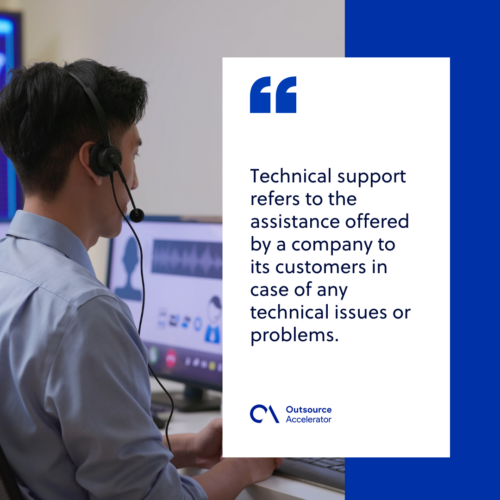Why you should offshore technical support

Delegating non-core business functions (i.e., non-revenue-generating processes) to offshore service providers has proven lucrative for businesses. For this reason, many companies offshore technical support processes to business process outsourcing (BPO) firms.
Outsourcing business processes to offshore BPO service providers has been a common practice among businesses for several years. Despite its prevalence, some business owners still hesitate to offshore technical support or any other process to third-party companies.
These businesses are usually small and medium-sized enterprises (SMEs) with no prior experience with outsourcing. However, turning to offshore outsourcing[1] is highly advantageous to these businesses.
This article will show you how opting to offshore technical support benefits companies.
What is technical support?
Technical support refers to the assistance offered by a company to its customers in case of any technical issues or problems. It is sometimes used interchangeably with customer support or customer service.
This support is provided by different professionals, depending on the nature of the company. A technical support employee can be an engineer, a computer programmer, or a specialist in another field.
Technical support professionals are responsible for answering the questions of users who have problems with the company’s product or services. These issues are often about computer software and applications.
Customers usually access technical support through telephone, email, or live chat. In some cases, technicians can visit customers at their offices to fix problems that cannot be solved remotely.
These specialists are often the first point of contact for customers with businesses. That’s why many companies choose to offshore technical support, to companies like ConnectOS, to ensure issues can be resolved swiftly and efficiently.

How do you offshore technical support?
To offshore technical support means to hand these processes over to an offshore BPO firm.
The first step in this procedure is finalizing how much you’re willing to allocate for this investment. Consider your needs, processes, and requirements.
Once you know how much you want to spend on offshore technical support, you can search for BPO providers with services that fit your budget. Outsource Accelerator’s BPO Directory, for example, is a great resource when you’re looking for the best offshoring provider.
Many BPO companies now cater to small and medium enterprises[2]. This means that even small businesses can now afford to offshore technical support.
You’ll also want to offshore technical support to a country where the workforce shares a language with your customers. For example, US companies will want to offshore technical support to countries with English-speaking workers, such as the Philippines.

Benefits when you offshore technical support
Having offshore technical support teams brings a host of benefits to companies. These advantages range from cost savings and better results to improved productivity.
These upsides of offshore technical support are discussed in more detail below.
Cost savings
Offshoring technical support nets businesses huge savings on salary and other overhead expenses. Offshore BPO providers often operate in developing countries (e.g., the Philippines and India) – rich sources of low-cost skilled labor.
Moreover, these firms often already possess the necessary technologies to run technical support operations. This further increases a company’s savings as it no longer has to spend on these equipment and software.
Another point where having offshore technical support teams lets businesses save money is on the recruitment side. Recruitment is almost always expensive and time-consuming, and offshoring removes this responsibility from companies.
Better results
When you find a good partner BPO, offshore technical support teams often yield better results than in-house ones. There are several reasons for this, including:
- Better technologies
- More experienced specialists
- Constantly upskilled staff
Improved productivity
Handing over technical support functions to offshore BPO firms improves the productivity of your in-house team. It lessens your office staff’s workload and lets them focus on more core aspects of their jobs.
Offshoring technical support boosts productivity in this process as well. Your offshore technical support team will have no other responsibility besides providing technical support and can focus on it better than your in-house team with other tasks to manage.

Where to offshore technical support
Typically, businesses in the US and other Western countries (e.g., Canada, the UK, and Australia) offshore technical support and other processes to developing countries.
The Asia-Pacific (APAC) region, particularly Southeast Asia, is among the top destinations for offshoring business processes.
In this region, the Philippines has positioned itself as one of, if not the most attractive offshore outsourcing destination for Western companies. The country’s reputation for being an outsourcing hotspot has earned it the recognition of being the “outsourcing capital of the world.”
The country is host to more than a hundred BPO companies, ranging from homegrown firms to global household names like Accenture and Teleperformance.
For a comprehensive guide on everything you need to know about offshore outsourcing, visit outsourceaccelerator.com. The company lists over 3,000 BPO companies in its directory and has more than 5,000 insightful articles about everything outsourcing.
References
[1] turning to offshore outsourcing. Buckley, P.J. Munjal, S. Requejo, I. (2022). “How does offshore outsourcing of knowledge-intensive activities affect the exports and financial performance of emerging market firms?” Journal of International Business Studies. https://doi.org/10.1057/s41267-022-00511-z
[2] BPO companies now cater to small and medium enterprises. György, O. Madaras, S. (2020). “Factors influencing SME outsourcing: Evidence from Romania.” Scientific Journal of Sapientia Hungarian University of Pennsylvania, 8(1) pp. 5-18. DOI: https://doi.org/10.2478/auseb-2020-0001







 Independent
Independent




